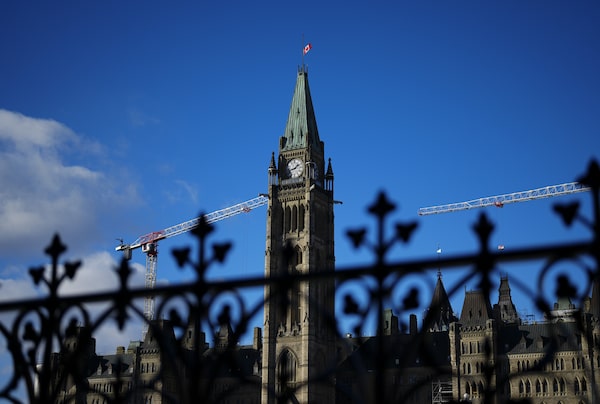
The Peace Tower of Parliament Hill in Ottawa on Dec. 13, 2023.Sean Kilpatrick/The Canadian Press
The federal Lobbying Commissioner is applauding a move by MPs last week to ban the practice of elected officials accepting lucrative trips, which parliamentary watchdogs have long warned could lead to conflicts of interest.
Last week, the House of Commons ethics committee passed a motion calling for the end of what’s called sponsored travel, and replacing it with an expanded budget for MPs that allows for two international trips a year. The revised rules would mean MPs’ international trips are funded by taxpayers, through their parliamentary budgets, rather than special interest groups.
Sponsored travel occurs when an individual, company or group pays for the travel, accommodation and hospitality costs of a member of Parliament. This is common practice among MPs of all parties who accept fully paid trips worth thousands, which, in the last few months alone, have taken MPs to the Middle East, Thailand, Japan, India and Spain.
Under the code of conduct for MPs, which is overseen by MPs, the elected officials have determined that they cannot accept gifts “that might reasonably be seen to have been given to influence the member.” However, the code goes on to exempt sponsored travel from that rule, which some MPs and several parliamentary watchdogs have said is irreconcilable.
Last year, Lobbying Commissioner Nancy Bélanger banned any group that is federally registered to lobby from offering free trips to MPs. The move significantly restricted who can offer the trips but didn’t stop the many non-registered groups from still doing this.
In an interview Ms. Bélanger told The Globe and Mail that she made the change because it was “completely inconsistent” to limit lobbyists from giving direct gifts to MPs of more than $40 but then allow them to offer free trips totalling in the thousands of dollars.
The changes were made to ensure that gifts and hospitality from lobbyists could not be seen to create a sense of obligation on public office holders, she said.
While she doesn’t have control over, or oversight of, the sponsored travel that MPs choose to accept, she said she is “pleased that the conversation will be happening.”
She also noted that the continued use of sponsored travel at the federal level is out of step with most provinces. For example, she said in Ontario, MPPs need to ask permission before they accept a trip. Federally, there are no limits on any part of a sponsored trip, including the number of times an MP can accept a trip or the total cost.
“If it is important for members of Parliament to travel, because it is part of their duty and function, and for them to be able to do their work appropriately, then it should be part of their budget,” Ms. Bélanger said.
Ethics watchdog says Trudeau accepted free vacation from ‘true friend,’ making gift acceptable
The House ethics committee’s motion to ban sponsored travel marked a significant reversal from its past positions on the issue. Less than a year ago, it had argued against any restrictions at all on sponsored travel. However, after debate over the Prime Minister’s most recent vacation controversy spilled into criticisms of the sponsored travel that backbench MPs take, Liberal, Conservative, Bloc and NDP MPs unanimously supported an explicit ban.
The motion was brought forward by NDP MP Matthew Green, who underscored the “absurdity” of the current rules, under which it’s unacceptable for him to accept a bottle of expensive champagne, but which allow him to travel somewhere with someone and then share that same bottle.
Mr. Green took part in a trip to the Middle East in January that was organized by a group called The Canadian Muslim Vote, which is not registered to lobby and can therefore still offer sponsored travel. Mr. Green told The Globe he covered his own costs during the trip.
The ethics committee called on the procedure and House affairs committee, which governs the Conflict of Interest Code for Members of the House of Commons, to impose the ban. However, already neither the Conservatives, nor the Liberals, will commit to implementing the motion that the small group of MPs passed.
Asked if the Official Opposition would support the ban if it was brought to a vote at the committee responsible, Conservative MP Michael Barrett sent a statement that only supported further study. “We look forward to the committee undertaking this work,” he said.
Liberal House Leader Steven MacKinnon said as a starting point his party isn’t opposed to the ban, but he also emphasized the review process. “We’re certainly open to it,” he said.
Most MPs last week defended the use of sponsored travel as key to better understanding the issues they debate and study on Parliament Hill. Some, though, also said they were open to ending it, should international trips be allowed through office budgets.
Liberal MP Pam Damoff said she in part supported the move to ban sponsored travel because the Lobbying Commissioner’s changes last year had already significantly restricted who can offer such trips. For example, she said past sponsored trips she took through World Vision and Results Canada would no longer be allowed because both organizations are registered to lobby.
“They were really useful, I went to Kenya, saw firsthand how Canadian money was being spent,” she said.
Marc Serré, a Liberal MP representing Northern Ontario, told The Globe that he doesn’t accept sponsored travel and doesn’t support the tradition.
“I don’t like the optics,” he said.